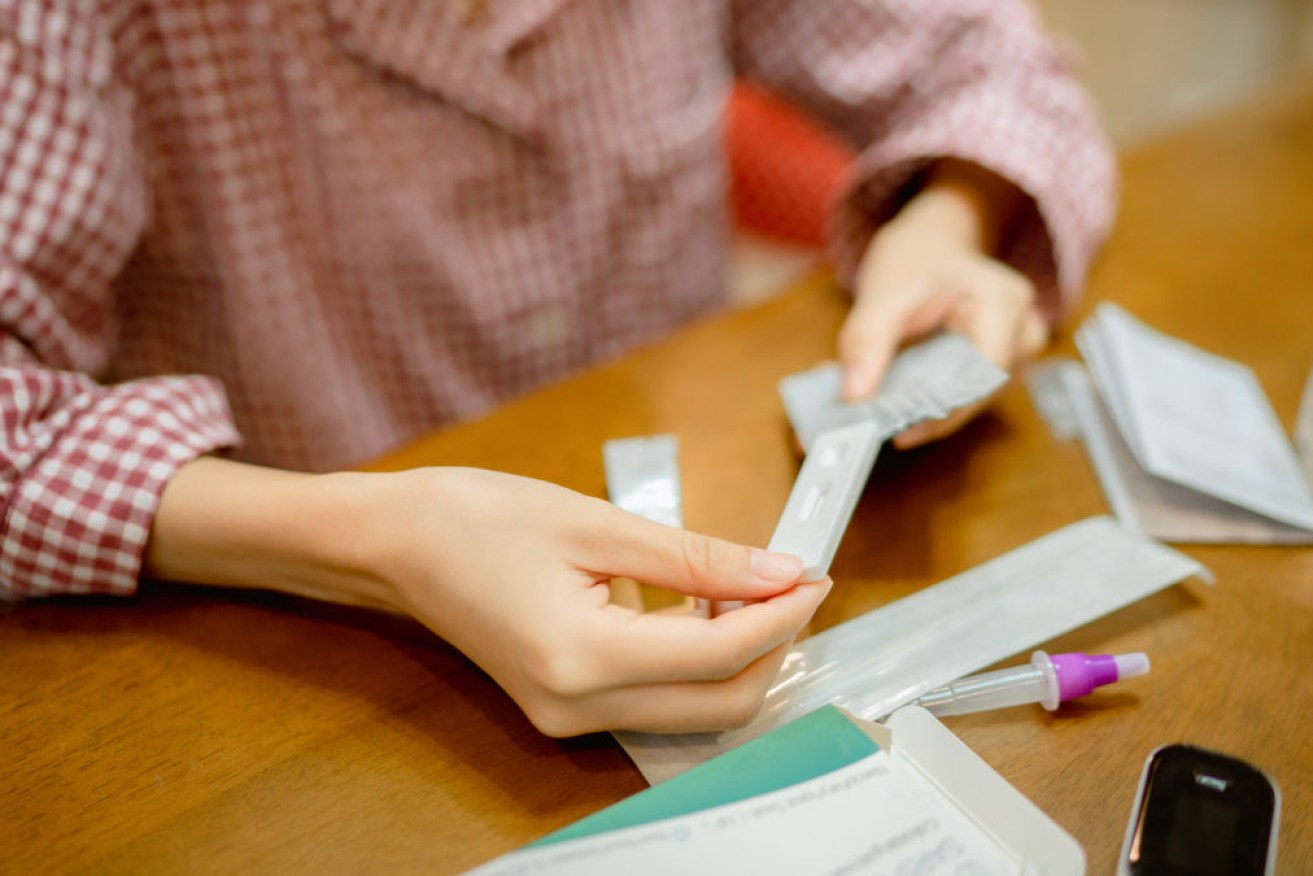Rapid antigen tests for COVID-19 are on the rise in Australia. Here’s how they work


Anyone who paid for a work-related COVID-19 test may be able to claim it as a tax deduction. Photo: Getty
Rapid antigen tests will be fundamental to Australia’s COVID-19 testing protocol as the country moves towards 70 and 80 per cent vaccination rates.
Medical professionals echoed New South Wales Premier Gladys Berejiklian’s confirmation on Sunday that the test “has an important role to play” in the future of Australia’s national plan to reopen.
Federal Health Minister Greg Hunt indicated on Tuesday that faster self-administered tests could soon be approved for use “within the coming weeks”.
But what is the COVID-19 test you’ll soon be taking? Read on to find out more.
What is a rapid antigen test?
According to the acting director of the Infectious Disease Unit at Austin Health, Patrick Charles, rapid antigen testing is a slightly less accurate, but more accessible type of COVID-19 test.
It will detect most cases of the virus, but it differentiates in many ways from the standard PCR test used in Australia, most notably its guarantee of results within minutes.
“With the antigen tests they can be done either as a swab or saliva test, there are different ones around, and it’s about as difficult as a home pregnancy test, where you put the sample on and it will give you one line if it’s negative and two lines if it’s positive,” Dr Charles told The New Daily.

Rapid antigen test kits for self-testing sold in France, Spain and Portugal. Photo: Getty
“It’s a very simple, easy test to do.
“It’s not quite as accurate at picking up an early infection. They’re looking pretty good, but they might miss a few early ones.”
How does it work?
A PCR test identifies COVID-19 infections through genetic material in DNA, while the rapid antigen test identifies proteins called antigens produced in the virus.
The PCR test requires a potentially infectious person to travel to a testing site to have a swab of their nose and throat taken by a medical professional, which is later examined and reported back to the patient.
The rapid antigen test also requires a swab sample but can be done at home without supervision.
“They require complicated analytic equipment only found in pathology laboratories and need expert lab technicians to run the equipment,” University of South Australia chair of Biostatistics and Epidemiology, Adrian Esterman said.
“Each PCR test takes about six hours to run, so it is not surprising that tests are returned usually after 24 hours,” Professor Esterman explained.
“Rapid antigen tests are almost the opposite … they come in a test kit, a bit like the ones used for pregnancy, and have results available in about 15 minutes.”
Along with quick results, the antigen test could work better at proving someone is no longer contagious, compared to the PCR test, Dr Charles said.
“Compared to the PCR test it’s not quite as accurate but it also might be slightly better at differentiating whether you’re contagious or not,” he said.
“It’s (PCR test) good for making the initial diagnosis, but it’s not so good at finding whether you’re no longer contagious.
“Whereas the PCR will stay positive for a long time, these ones go from negative to positive back to negative a bit more, in line with the period where you are contagious.”
Why are you not taking them yet?

PCR tests are most cost effective for people and more accurate at identifying infection. Photo: Getty
The major downside to rapid antigen tests is the cost to the patient and the issue of availability.
Dr Charles said the test was so popular around the world that there were not many of them in Australia at the moment, and getting them would be difficult.
He added he did not know anyone who had used the test in Australia.
“It’s costly if you are doing this every day. If you are wanting to go to school or work five days a week it’s going to end up a little expensive,” Dr Charles said.
“The way we do the testing is not Medicare rebatable, so you’d end up doing it all out of pocket. There is also just that concern where you do miss a small number where there might be an outbreak despite this.”
Professor Esterman said packets of 10 test kits were available free of charge from chemist shops in the UK, intended for home use.
“I really can’t see why there should be too much objection to people using them at home,” he said.
Questions over antigen accuracy
Premier Berejikilian said on Sunday rapid antigen testing has a very good place at workplaces but that it was “nowhere near as accurate as PCR testing”.
“It still has a major role in how we deal with this outbreak, but in the future when we have 70 and 80 per cent double dose, rapid antigen testing has an important role to play.”
But epidemiologist Mary-Louise McLaws said rapid antigen testing could be as accurate as a PCR test, referencing a US study that outlines the increasing effectiveness of the newer test when used twice a week.
Since April, the UK has given everyone access to two rapid coronavirus tests a week.
“Rapid antigen tests can be highly effective. They are very good for screening – you don’t use them for diagnosis – but they perform at the same level as the top PCR tests when you repeat them on a basis of twice (a week),” Professor McLaws told The New Daily.
“So if you do two rapid antigen tests it equates to the same level of sensitivity and specificity of a PCR.”
When should we use them?
The test will be used much more frequently as lockdowns end and schools and larger workplaces reopen, Dr Charles said.
“It’s going to have a role, particularly as we go back to opening up more. While we are in this period of general lockdown in most places with COVID-19 it has less of a role, but I think it will emerge,” he said.
“If people are doing regular testing then potentially they could identify it relatively early and then not go to school or work in that setting and hopefully have fewer secondary cases.”
Professor Esterman added rapid antigen tests work best in the first two to three days before symptoms develop and in the first week after symptoms arise.
However, Australia’s medicine regulator the Therapeutic Goods Administration currently bans people from using rapid antigen tests at home and that tests must be administered under the supervision of a healthcare professional.
On Tuesday, TGA released an interim document providing guidance to businesses who are considering using COVID-19 rapid antigen tests.
It states tests can only be “legally supplied under specific conditions”, including being administered by a trained health practitioner.








